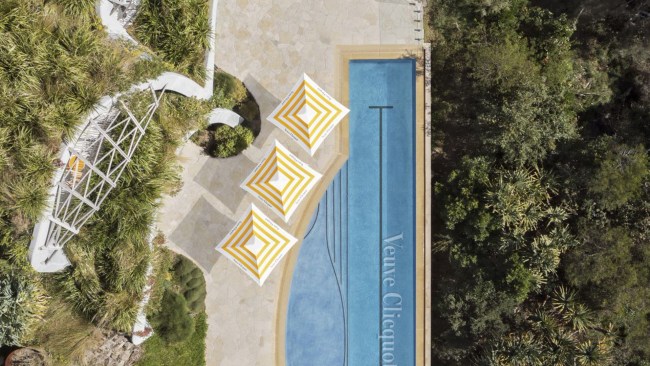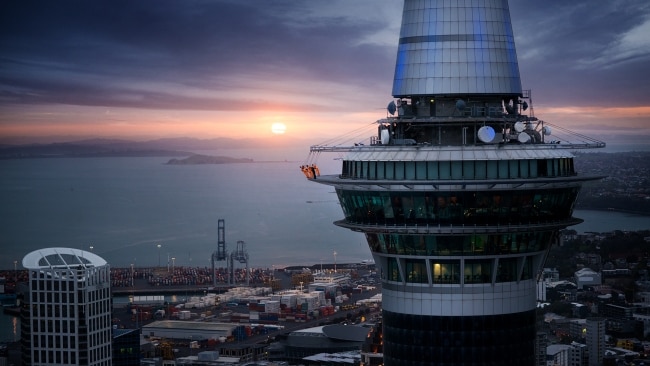Fly me to the dunes
SWIMMING in the key-hole shaped plunge pool outside tented suite 26 at Al Maha Desert Resort & Spa is akin to being lightly poached.

SWIMMING in the key-hole shaped plunge pool outside tented suite 26 at Al Maha Desert Resort & Spa is akin to being lightly poached.
I am not sure of the temperature today but it must be more than 40C; the water is as warm as a bath and the air so dry my head aches. This is the desert outside Dubai, in the United Arab Emirates, and it is not for those who get the vapours at the prospect of crisp heat.
There's not a cloud in the sky but three bore-wells provide all the water from ancient aquifers at this luxe encampment on the Dubai desert conservation reserve.
The territory covers more than 200sq km over four defined-usage zones and is about 45 minutes by road from downtown Dubai. Al Maha is owned by Emirates and the designers, no doubt with a generous budget, have done well to include a pool with every guest tent; tiled in bright blue, with ring-necked parakeets flitting in flashes of lime green over the water, these little oases cool the eyes and make you feel refreshed, even if you are hiding inside in full-on airconditioning contemplating the pool and a seemingly limitless landscape of dunes rippling to the hazy horizon.
There are 42 tented suites, and would you like an Arabian oryx with that? This white species of antelope, with its tufted tail and straight horns so long they look as if they could pierce the sky, is so emblematic of the region that it gives Al Maha its Arabic name and appears on the logo.
But its presence at Al Maha -- there are about 320 roaming wild and usually one or two loitering about each tent -- is not the stuff of serendipity but the result of a successful breeding program. Hunted almost to extinction by the 1960s, the Arabian oryx was decreed endangered by the 70s. Dubai's then ruler, Sheik Rashid, stepped in; the last remaining antelopes were captured and taken to the US, where they were bred under secure conditions.
In 1997, the then Crown Prince, now ruler of Dubai and Prime Minister of the UAE, Sheik Mohammed bin Rashid al-Maktoum, funded the reintroduction of the Arabian oryx by bringing back more than 100 descendants of the original herd and relocating them to the embryonic Dubai desert reserve.
The tented suites, in various configurations, all have a safari theme with heavy brass-studded doors, a canopied canvas ceiling, rich red rugs, old chests, carved wooden bed, wall niches with copper pots, even an easel with a drawing block and set of pastels and a pair of binoculars. There are original paintings, wall-mounted weapons, urns and lovely glossy books on the region. Despite all this rather self-conscious and art-directed clutter, there's a lightness, a sense of being loosely tethered.
Perhaps you are meant to feel like a Bedouin nomad, part of a caravanserai; the unhitched camels could be brought by at any moment for the next stage of the journey. Just remember to roll up the iPod docking station and the Nespresso machine in that Persian rug.
Rather than a Lawrence of Arabia lookalike, it's ranger Jacques who arrives, an expatriate South African field guide, to take me into the dunes for a spot of wildlife viewing.
But not before a cracking afternoon tea spread in the main building -- scones with thick jam and cream, chocolate cake, plates of plump dates, and tea and coffee in silver urns -- which is much the same as one gets in an African safari lodge or up-market camp. In Dubai, as well as, say, the Serengeti or the Kruger, the animals are hot in summer and come out to drink in the cool of early morning and late afternoon. Accordingly, that is when we game-chasers go out.
We bound along, past date palms, toothbrush trees (its twigs can be used to clean your choppers), clumps of bristle grass and yellow-flowering acacia.
There is not a lot to see today but Jacques's descriptions of the landscape and habitats are riveting; like all good rangers and trackers, he has uncanny vision and suddenly he stops the four-wheel-drive, leaps out and dives into the sand. He emerges with a yellow-spotted agama (Trapelus flavimaculatus) in his hand; it's a lizard with a very cross face and hard little eyes and he encourages me to stroke it. It feels like a handbag, I tell him, for lack of a more enthusiastic description.
The desert is unforgiving and the animals are not of the cute greeting-card variety but sinewy creatures, often in camouflage colours. My spotter's checklist grows, with sandfish, geckoes, side-winding vipers, an osprey, bustling little grey francolins shaped like matrons and frisky sand gazelles. There are more than 33 mammal and reptile species, including the Arabian red fox ("elusive," says Jacques with a sigh, when I ask). But it's the Arabian oryx that stands out with its creamy coat, which Jacques explains reflects the heat and keeps it cooler. The oryx has no predators in this patrolled and fenced conservation area but long ago it was preyed on by leopards and Arabian lions.
Other activities at Al Maha include a falconry display, nature walks at first light, sunset camel treks, dune-bashing and, perhaps best of all, the opportunity to ride the retired racehorses of the ruler of Dubai; their stables are appropriately regal and the horses are very well looked after, just as they are at the Emirates-owned sister property, Wolgan Valley Resort, just past the Blue Mountains west of Sydney. This NSW rural spread shares the same high environmental values as Al Maha; both have conservation officers and invest a percentage of profits back into the protection and management of the respective reserves.
Guests are treated as precious resources, too, at Al Maha, with a high ratio of staff to each tent. There's the largest collection of original Arabian artwork and artefacts in the Gulf but it is all displayed casually, with little fanfare. Perhaps the curators realise it can't compete with the sheer drama of the surroundings.
The stars sparkle like gemstones in the clear, wide desert sky, a spectacle best viewed on one's back, floating in that plunge pool, which has cooled down nicely after dark, listening to the soft cooing of collared doves. A dip before dinner and a cocktail with a name such as sun-roasted nut or desert oasis on the deck of the resort's Al Diwaan restaurant overlooking a waterhole (Arabian oryx by moonlight could surely be added to the fancy drinks list) and a 180-degree sweep of contoured dunes and the shadowy shapes of the Hajar Mountains.
There is cinnamon and saffron-cured wagyu beef carpaccio with compressed watermelon set in rosewater jelly and seven-spice emulsion, and desserts that include rose-petal marshmallow and pistachio nougat, so we are not talking dusty camel chops and unleavened bread.
And did I mention the Timeless Spa? No time to try a treatment on my one-night visit but there's a frankincense facial and a Cleopatra's Secret milk bath with my name on them should I ever get back. The desert may be synonymous with hardship -- Al Maha is anything but.
Susan Kurosawa was a guest of Emirates.
Checklist
Al Maha Desert Resort & Spa has a summer special, valid to September 7, of one free night for every two consecutive nights booked. Tariff includes all meals and non-alcoholic drinks and two nature-based activities a day. More: www.emirateshotelsresorts.com.



